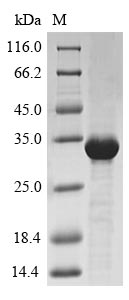Recombinant Triticum aestivum Trypsilpha-amylase inhibitor CMx2 is expressed in E.coli, covering the full length of the mature protein from amino acids 25 to 121. This recombinant protein features an N-terminal 10xHis-SUMO tag and a C-terminal Myc tag, which appears to enhance solubility and detection. The purity exceeds 85% as determined by SDS-PAGE, making this product suitable for research applications that require high-quality protein samples.
Trypsilpha-amylase inhibitor CMx2 comes from wheat and seems to play an important role in blocking specific amylase enzymes. This blocking action may be significant when studying how enzymes are controlled and how proteins interact within different biological pathways. Its distinctive properties likely make it a useful tool for research into enzyme activity and regulation, potentially offering insights into biochemical processes and applications in biotechnology.
Potential Applications
Note: The applications listed below are based on what we know about this protein's biological functions, published research, and experience from experts in the field. However, we haven't fully tested all of these applications ourselves yet. We'd recommend running some preliminary tests first to make sure they work for your specific research goals.
Triticum aestivum Trypsin/alpha-amylase inhibitor CMx2 is a plant protein that requires precise disulfide bond formation and proper tertiary structure for its inhibitory activity against trypsin and alpha-amylase. The E. coli expression system cannot perform the necessary post-translational modifications (particularly proper disulfide bonding) that are critical for this protein's native conformation. The dual N-terminal His-SUMO tag (∼20 kDa) and C-terminal Myc tag may sterically interfere with the protein's active sites and proper folding. While the protein may be soluble, it is highly unlikely to achieve the correct folding needed for functional inhibitory activity.
1. Antibody Development and Validation Platform
This recombinant protein serves as an excellent immunogen for generating antibodies against linear epitopes of the wheat inhibitor. The mature protein sequence ensures comprehensive epitope coverage. The dual tags facilitate purification and provide additional epitopes for screening. However, antibodies may not efficiently recognize conformational epitopes on the native, properly folded inhibitor.
2. Comparative Biochemical Characterization Studies
This is the essential first step to assess the protein's physical properties. Basic biophysical characterization is valuable for quality control, but functional studies are not feasible without proper folding. Techniques like circular dichroism can analyze secondary structure content, while size-exclusion chromatography can determine oligomeric state and homogeneity. However, functional inhibitory assays will likely yield negative results due to probable misfolding.
3. Tag-Based Detection Method Development
This protein is well-suited for developing and optimizing detection methods that leverage the dual tags. The His and Myc tags enable sandwich ELISA protocols, Western blot optimization, and other immunoassay developments that depend on tag recognition rather than protein function.
Final Recommendation & Action Plan
This dual-tagged recombinant inhibitor is primarily suitable for antibody development and tag-based detection applications, but fundamentally unsuitable for functional studies due to E. coli's inability to produce properly folded plant protein with correct disulfide bonding. The immediate priority is Application 2 (Biochemical Characterization) to assess the protein's physical properties through CD spectroscopy and SEC analysis. Applications 1 and 3 (Antibody Development and Tag-Based Detection) can proceed immediately. Interaction studies must be avoided entirely due to the high probability of misfolding. For functional inhibitor studies, alternative approaches using eukaryotic expression systems (e.g., plant-based or yeast systems) or native purification from wheat are essential.






